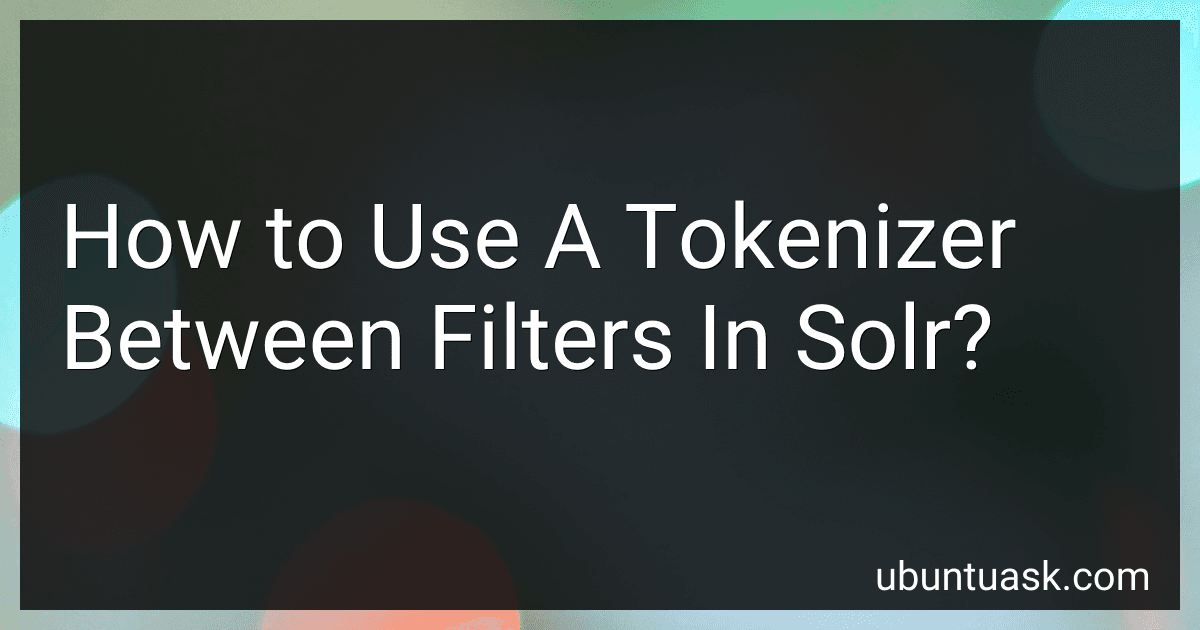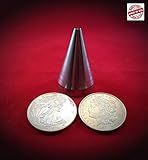Best Tokenizer Tools to Buy in February 2026
In Solr, a tokenizer is used to break down the input text into individual tokens, which are then passed through a series of filters for further processing. To use a tokenizer between filters in Solr, you need to define the tokenizer as part of the field type in the schema.xml file.
First, you need to specify the tokenizer class that you want to use, such as StandardTokenizerFactory or WhitespaceTokenizerFactory. Next, you need to define the filters that you want to apply to the tokens after they have been tokenized. These filters can include stopword filters, lowercase filters, and stemming filters, among others.
To configure the tokenizer between filters, you can use the and tags in the field type definition. The tokenizer should be defined before the filters, so that the input text is tokenized before being passed through the filters.
By properly configuring the tokenizer between filters in Solr, you can ensure that your input text is processed correctly and effectively for indexing and searching purposes.
What are some popular token filters in Solr?
- Lowercase Filter: Converts all characters to lowercase.
- Stop Filter: Removes common words (such as 'and', 'or', 'the') from the token stream.
- Synonym Filter: Replaces tokens with their synonyms.
- Stemming Filter: Reduces words to their base or root form (e.g. 'running' becomes 'run').
- ASCII Folding Filter: Converts non-ASCII characters to their closest ASCII equivalent.
- Phonetic Filter: Converts tokens to their phonetic representation for fuzzy matching.
- Word Delimiter Filter: Splits compound words into separate tokens.
- Shingle Filter: Creates all possible combinations of adjacent tokens.
- Edge Ngram Filter: Generates n-grams of a specified size from the beginning of tokens.
- Length Filter: Filters out tokens based on their length.
What is the purpose of using filters with a tokenizer in Solr?
The purpose of using filters with a tokenizer in Solr is to transform or modify the tokens generated by the tokenizer during the analysis process. Filters can be used to remove stop words, stem words, lowercase text, or perform other linguistic transformations to improve the quality of search results. Filters help to standardize the tokens and make them more relevant for searching and matching documents in the Solr index.
How do I specify a custom tokenizer in Solr?
To specify a custom tokenizer in Solr, you can create a new tokenizer class that extends org.apache.lucene.analysis.Tokenizer and implements the tokenStream() method. Once you have created your custom tokenizer class, you can configure Solr to use it by adding it to the analyzer in the schema.xml file.
Here is an example of how to specify a custom tokenizer in Solr:
- Create a new Java class for your custom tokenizer, for example, CustomTokenizer.java:
import org.apache.lucene.analysis.Tokenizer; import org.apache.lucene.analysis.tokenattributes.CharTermAttribute; import java.io.IOException;
public class CustomTokenizer extends Tokenizer {
private CharTermAttribute termAtt;
public CustomTokenizer() {
termAtt = addAttribute(CharTermAttribute.class);
}
@Override
public boolean incrementToken() throws IOException {
// Your custom tokenization logic here
// Set the term attribute to the next token
termAtt.setEmpty().append("custom\_token");
// Return true if there are more tokens
return true;
}
}
- Build your custom tokenizer class as a JAR file and add it to the lib directory in Solr.
- Update the schema.xml file in Solr to use your custom tokenizer. Add the following configuration to the field type or field definition where you want to use the custom tokenizer:
Replace the "com.example.CustomTokenizerFactory" with the fully qualified class name of your custom tokenizer class.
- Reload the core in Solr to apply the changes.
Your custom tokenizer will now be used by Solr for tokenization in the specified fields. You can customize the tokenization logic in your custom tokenizer class to suit your specific requirements.
What are some common pitfalls to avoid when using tokenizers in Solr?
- Inadequate tokenization: Make sure your tokenizer is configured properly to accurately separate tokens. Otherwise, this can lead to incorrect search results and lower relevance in your search queries.
- Over-tokenization: Be cautious when using tokenizers that split text into too many tokens, as this can lead to an overwhelming number of results and reduce the effectiveness of your searches.
- Incorrect ordering of token filters: Ensure that your token filters are applied in the correct order to avoid unintended consequences, such as removing important tokens or altering the meaning of the text.
- Limited understanding of language-specific tokenization rules: Different languages have their own unique tokenization rules and patterns. Make sure to use language-specific tokenizers and filters to ensure accurate tokenization for each language.
- Not considering case sensitivity: Depending on the requirements of your search, consider whether or not you need to account for case sensitivity in your tokenization process. Failure to do so could lead to missed search results or inaccurate matches.
- Ignoring custom tokenization rules: If your data includes special characters, abbreviations, or specific formatting that requires custom tokenization rules, make sure to account for these in your tokenizer configuration to ensure accurate tokenization.
What is a tokenizer in Solr?
In Solr, a tokenizer is a component of the analysis chain that breaks up a stream of text into individual terms or tokens. It is responsible for identifying word boundaries, removing punctuation, converting characters to lowercase, and performing other actions to normalize the text before indexing. Tokenizers are essential for the process of searching and indexing text in Solr, as they determine how the raw text data is transformed into searchable terms.
How does a tokenizer work in Solr?
In Solr, a tokenizer is a component of the analysis chain that breaks up a stream of text into individual tokens or terms. This process is essential for text analysis and indexing in Solr.
When a document is indexed in Solr, the text content is passed through the analysis chain, where the tokenizer is the first component to start the process. The tokenizer splits the text into individual tokens based on a specified set of rules, such as whitespace, punctuation, or specific characters.
The tokens generated by the tokenizer are then passed through subsequent components in the analysis chain, such as filters and tokenizers, which further process the tokens for stemming, stopword removal, and other text processing tasks.
Overall, the tokenizer in Solr plays a crucial role in breaking down the text content into manageable tokens for indexing and searching purposes.



